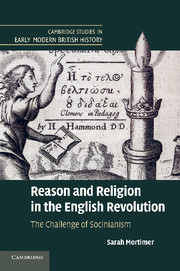Book contents
- Frontmatter
- Contents
- Acknowledgements
- Abbreviations and conventions
- Introduction
- 1 The Socinian challenge to Protestant Christianity
- 2 Socinianism in England and Europe
- 3 The Great Tew Circle: Socinianism and scholarship
- 4 Royalists, Socinianism and the English Civil War
- 5 Socinianism and the Church of England
- 6 Reason, religion and the doctrine of the Trinity
- 7 Anti-Trinitarianism, Socinianism and the limits of toleration
- 8 Socinianism and the Cromwellian Church settlement
- Conclusion: the legacy of Socinianism
- Bibliography
- Index
2 - Socinianism in England and Europe
Published online by Cambridge University Press: 05 May 2010
- Frontmatter
- Contents
- Acknowledgements
- Abbreviations and conventions
- Introduction
- 1 The Socinian challenge to Protestant Christianity
- 2 Socinianism in England and Europe
- 3 The Great Tew Circle: Socinianism and scholarship
- 4 Royalists, Socinianism and the English Civil War
- 5 Socinianism and the Church of England
- 6 Reason, religion and the doctrine of the Trinity
- 7 Anti-Trinitarianism, Socinianism and the limits of toleration
- 8 Socinianism and the Cromwellian Church settlement
- Conclusion: the legacy of Socinianism
- Bibliography
- Index
Summary
The Socinians were vigorous evangelists of their gospel, travelling across Europe and zealously distributing texts that promoted their cause. They had had some notable successes in Germany, particularly at Altdorf, and they had certainly managed to raise interest and some limited support in the United Provinces. In the early years of the seventeenth century they hoped to persuade English men and women of the truth of their message. How they fared in the years before the Civil War will be the subject of this and the next chapter.
England must have seemed fertile ground for Socinian ideas in 1609 – certainly the editors of the Racovian Catechism thought so when they dedicated their work to King James I. But, as we shall see, English soil proved stonier than the editors expected; King James was outraged by the dedication and in 1614 he had the work publicly burnt in central London. Although the Catechism provoked this harsh response, interest in Socinianism seems to have died down fairly quickly. Indeed, it did not last much longer than the flames which had destroyed the Catechism at Paul's Cross. In Europe, however, the Socinians continued to attract outrage and opprobrium throughout the 1610s and 1620s. English people certainly knew of the Socinians' reputation in Europe, not least from the refutations written by countless Lutherans, Calvinists and Catholics. By the 1630s that knowledge had increased greatly, and Socinianism was beginning to be taken seriously by scholars and by theologians in England.
- Type
- Chapter
- Information
- Reason and Religion in the English RevolutionThe Challenge of Socinianism, pp. 39 - 62Publisher: Cambridge University PressPrint publication year: 2010



